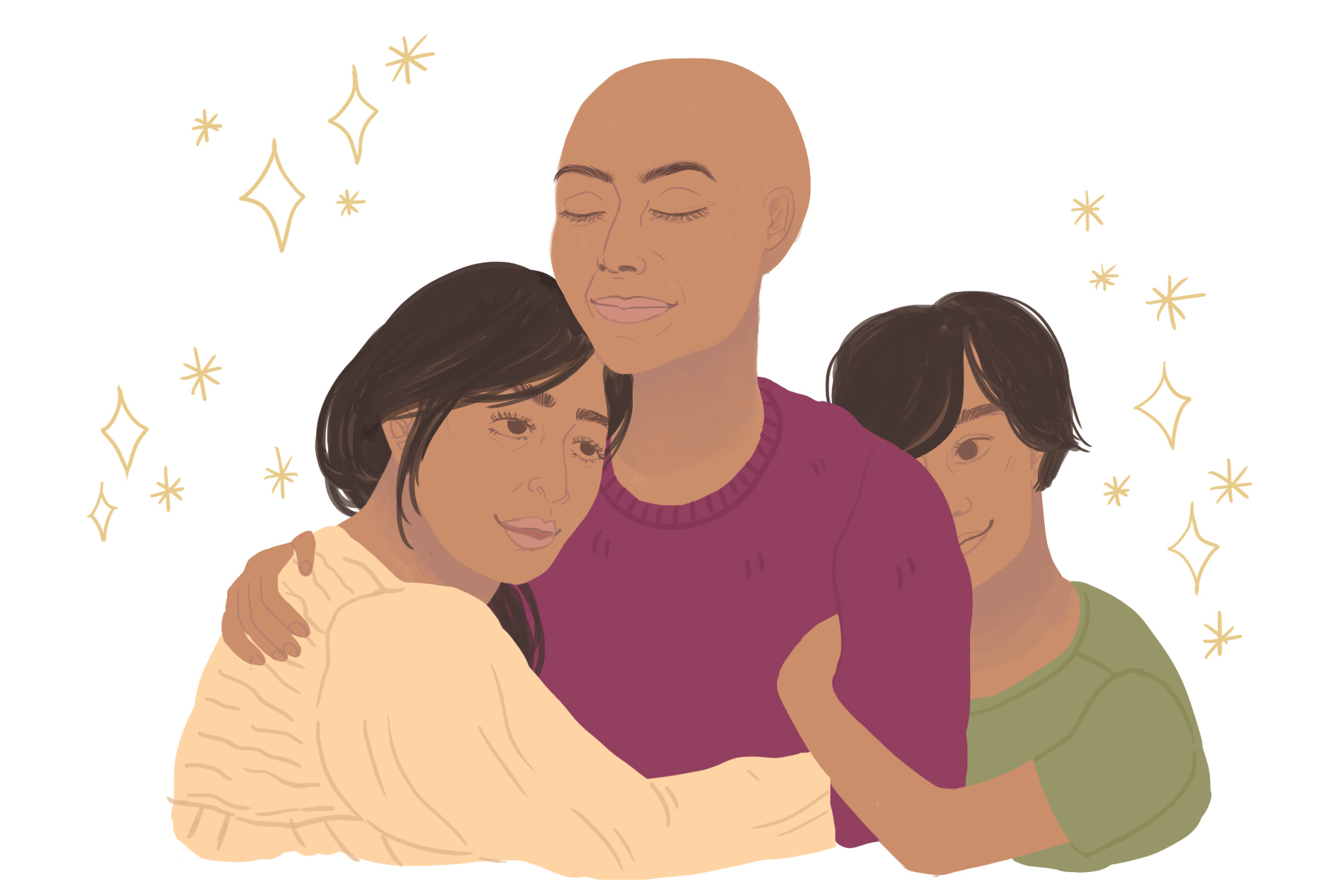
Diagnosis, expected: how to truly be there for a loved one with a life-changing diagnosis
Tashmia Owen
16 Feb 2020
Illustration by Ragavee Balendran
I was diagnosed with Stage 3 breast cancer a year ago.
A year of needles, IV drips, beeping machines, confirming my name, my date of birth, of travelling to hospital, of coming home. A year of naps; sleepless neverending nights; silent, limitless daydreams; piercing, gut-wrenching nightmares. A year of losing myself, of becoming unrecognisable to the trace of my fingertips, of seeing myself raw, without my skin, without the sinewy muscle and tissue that held me together.
A year without the surface people needed to see me.
Our responses to a loved one being diagnosed with a life-threatening disease are primal. There is the fear, the loss, the disbelief that darkness has set in so deep we cannot see where the shadows are any longer. It is that terror, the sense all oxygen has been stifled that causes the claustrophobia that tightens around us. The proximity, the threat of weakness, of long drawn-out illness, of death moving into our lives.
It is human to imagine if it had been us. To think of when we came close, go home and hold our loved ones fiercely, secretly thankful it missed us this time. As a cancer patient there is no rule book on how to be – I can, however, tell you what creates the best support as friends.
1. Do not centre yourself
Once you have processed the shock, the pain, the worry, remove yourself from the picture in your mind. Empathy does not always grow from imagining ourselves in someone’s shoes. What takes root is a centring of ourselves in a story that is not ours to tell. Learn how to step back, to listen, to allow your loved one the space to feel, to explore what is happening to them. Do not become the voice they hear in quiet moments taking over their own thoughts.
It closes doors. It shuts down communication and loses trust.
A sentence immediately used is, “If you ever need anything let me know”. By making this offer, we relinquish our responsibility to think about and follow up on help. We place the onus of receiving help on the person who needs it the most. Take the initiative and be clear on what you can offer.
2. Listen
Seemingly simple, but many find this difficult. In our busy lives, dashing places, answering emails and texts, there is little time to pause. When there are few pauses, there are fewer silences – so when do we hear what needs to be heard?
Do not assume you know what is needed – do listen and do take the initiative. When friends thought about who I was and remembered moments they had shared with me – and allowed those things to guide them, that’s what worked best.
I found myself submerged in thoughts and feelings I could not process. When I was given the space to say what I really felt without judgement, I felt the most supported.
3. Ask
Ask how they are feeling. Send a text, let them know no answer is needed, no time constraints. Unless a space is created which feels safe to talk, to be heard, to have the time, it is of little value to either of you. When you ask, consider them, their feelings, the way they are processing their reality – is this what they want?
When there is a new development, ask, ‘how does that make you feel?’ Chances to connect with my deeper thoughts, on a base level, were the most powerful moments with those I love. It was a gift of trust, respect and humility.
4. Do not ask them to call you if they need anything.
It will not happen. By making this offer we relinquish responsibility to think about and follow up on help. We place the responsibility of receiving help on the person who needs it the most.
5. It is ok not to be able to offer help
Do not make promises you cannot keep, and do not feel the need to do so. A genuine “I am sorry you are going through this” in a card goes so much further than well-meaning ghostly illusions of what you plan to do.
Early on in my diagnosis I reached out to a few people who had offered help. I shared fears and worries about my children’s futures, I asked for help in finding a way to keep them safe. I will never forget the humiliation they made me feel, their indignation. It is ok to say no. It is ok not to offer. However, offering false hope, promises or judgement is on you. In my most fragile shadow-filled moments the sense of rejection that came from those who have ghosted me, or left me in the middle of things they had set me doing, came at a huge cost to my peace.
6. Practicalities
Breaking down the everyday is an immeasurable help. Little acts of kindness dusted through the months softened so many shadows. Popping over with a dish to put in the fridge, or sending a takeaway helps take the pressure off. Whether you drop in and empty the bins once a week or get a voucher for a cleaning service it all helps. And a group of friends tidied up the garden creating a space where the children and I could breath. If you are going to the supermarket or pharmacy, send a text. Let them know you are thinking of them, and are physically able to pick up anything they need. The world outside keeps turning, utility providers, and landlords all need paying. Help with post and any tasks is a burden eased.
7. Going out
Going for a walk in the woods, coffee with friends, trips to the cinema, dinners out to exciting places, languid afternoon picnics, concerts. Keep inviting us to be part of life, your life, and our own. These are the moments that kept me anchored to everything that I loved, the moments that reflected the light that was not always readily visible.
8. Children
If your loved one has children, check in on them. Let them know you are there if they need to chat, if they need help with practicalities, or if they just want to hang out away from reminders of it all. Doing this through your actions is most effective. Seeing you are able to make the time, examples of what you are able to do is a reassurance, and creates a space where they can ask for things with confidence.
9. Support and company for treatment
There were days a friendly face – someone to ensure I stayed hydrated and fed whilst on an infusion – created a sense of security, of being looked after, of being. Take the lead from your friend, ask them, listen, and know the difference your presence makes, whether you are physically there or taking the time to find out.
10. Gifts
I received some of the most generous and thoughtful gifts through my treatment. Things that helped me feel pampered, luxurious, seen. Being thought about, cared for, loved – is a powerful act.
11. Fundraise
On top of the physical, emotional and mental trauma a serious medical diagnosis can have, there is an aching financial impact. A collection towards travel, car parking fees, food and heating has a very real impact.
12. Joy, laughter, frivolity
Being a patient is tough. It is also mind-numbingly, soul-crushingly boring. Finding ways to have fun, to laugh, to be silly, to be frivolous while everyone sees you diminishing, wavering, slipping in and out of who you are, it is an act of defiance. Send memes, gifs, silly messages, tease, cajole, allow your friend the space to stretch into the dark recesses with the humour only those close to them could understand. Remember that each day counts.
We do not know how it will end, or how long it will go on for, and as the ride keeps spinning there are moments we can take a little break, a cessation, a heart beat.
Then it all keeps spinning and all that matters is that we made each moment count, as the images and emotions begin to form a picture of what will be left behind.
This part of Tashmia’s Diagnosis, expected series







